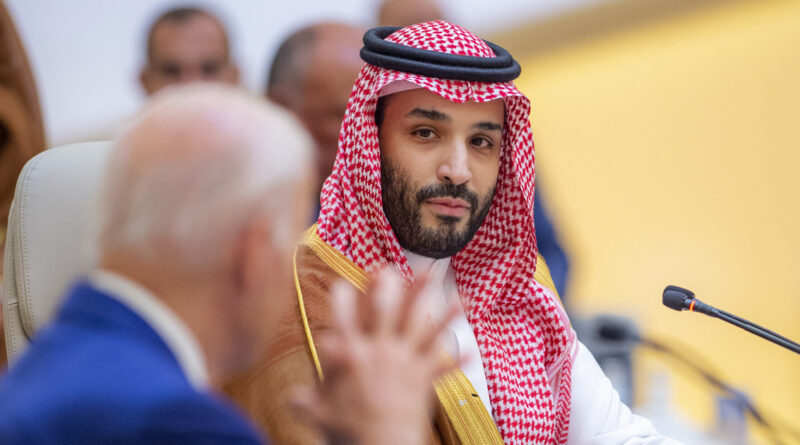Clock ticks on U.S.-Saudi deal as election and Gaza war threaten to derail landmark agreement
DUBAI, United Arab Emirates — Despite the United States and Saudi Arabia reaching the final stages of a landmark trade and defense deal, the culmination of such a milestone agreement is far off, with Israel’s war in Gaza and the timing of the American presidential election stalling negotiations.
A senior White House official said last week that there was a “near-final” set of arrangements for a bilateral deal that would help boost the Gulf kingdom’s military defenses against traditional arch-rival Iran, would provide U.S. help with Saudi civilian nuclear infrastructure, and would increase ties between the two countries’ tech industries.
On May 2, State Department spokesperson Matthew Miller said the details on a U.S.-Saudi part of the deal could be finalized “in very short order.”
“We’re very close to reaching an agreement,” he said.
But the clock is ticking.
While some Republicans are also pushing for a U.S.-Saudi bilateral defense agreement, Democrats in Congress are very unlikely to approve such a deal without having concrete assurances about a future Palestinian state.
“There is probably an eight-week window to get something done before elections get in the way,” a Republican congressional aide told NBC News last week. “The security piece would have to pass the Senate, but the civilian nuclear piece would require House and the Senate consideration. Maybe something could pass with a clause adding Israel later, but political support for that would be difficult at this time.”
Paul Salem, the president of the Washington-based Middle East Institute think tank, was also pessimistic about the chances of an overarching deal involving the normalization of relations with Israel being reached before November’s presidential election. Instead, the U.S. and Saudi Arabia could sign a series of smaller deals that did not require approval from Congress or the Senate, he said.
The Saudi kingdom is looking for “a deeper security assurance and relationship with the U.S.,” Salem said, perhaps in the form of arms purchases and “a strategic treaty, something that clarifies U.S. commitment to Saudi Arabia if it is attacked.”
More controversially for some in the U.S., as well as for some of the kingdom’s neighbors, the Saudis are looking to boost their civilian nuclear sector.
“They have made it clear they would prefer to do that with the U.S., rather than look elsewhere, whether that be Europe or South Korea or China and Russia,” Salem said.

Both the U.S. and Saudi Arabia wanted to solidify tech industry relationships. While the kingdom is spending big as it tries to build a tech industry to complement its oil dominance, Salem said the U.S. has been pressuring it not to take technology from China but “the Saudis are saying they need it.”
“The U.S. is seeking Saudi investment in the tech sector, so there are all sorts of wins for them there,” Salem said, adding that it would also benefit economically from the sale of arms and by underwriting its nuclear program.
After meeting with White House national security adviser Jake Sullivan last week, Saudi Arabia’s Crown Prince Mohammed bin Salman wrote on X that “the semi-final version of the draft strategic agreements” between the U.S. and Saudi Arabia were “almost being finalized.”
He added that they had also discussed “a credible track towards the two-state solution in a way that meets the aspirations of the Palestinian people and their legitimate rights.”
After Hamas’ Oct. 7 attacks killed 1,200 in Israel and triggered the war in Gaza, where Israel has killed more than 36,000 people, bin Salman “is thinking about his broader legitimacy and legacy, and being able to deliver something more meaningful for the Palestinians would be helpful,” said Sanam Vakil, the director of the Middle East and North Africa program at the London-based think tank Chatham House.
Saudi Arabia’s population “is quite young and they are being quite radicalized or politicized,” she said. “There is no real avenue to express dissent beyond channeling some frustration on social media and then also maybe fundraising for Gaza. The level of fundraising is quite high and that’s an indication that people care.”
Sen. Lindsey Graham, R-S.C., who has traveled to Saudi Arabia several times in the last 12 months, is a supporter of an overarching deal with Saudi Arabia.
He has heaped praise on Mohammed bin Salman as pushing forward with a “vision for the region” despite the hurdles. But in an interview with the Jerusalem Post earlier this month, Graham made it clear there would “not be 67 votes in the United States Senate for a defense agreement between Saudi Arabia and the United States that doesn’t have an Israeli component.”
NBC News reached out to Senate Republican Leader Mitch McConnell and House Speaker Mike Johnson in order to gauge wider GOP support for a pact, and did not immediately receive a reply.
And on Tuesday the gap between Saudi Arabia and Israel appeared to widen, when state media reported that the kingdom’s foreign ministry had denounced what it called the “continuous genocidal massacres committed by the Israeli occupation forces against the Palestinian people” in Rafah.
As long as war rages in Gaza, Vakil said it was “unrealistic” to expect Saudi Arabia to normalize relations with Israel in a manner similar to the Abraham Accords of 2020, which established relations between Israel and the United Arab Emirates, Bahrain, Morocco and Sudan.
Although Israeli Prime Minister Benjamin Netanyahu took much of the credit for helping integrate his country into the region when the accords were signed, the war in Gaza, the extreme-right stance of the Israeli government and the public sentiment have dramatically changed the equation.
“It seems unrealistic that this can be achieved in a trilateral sense before the (American) election,” she added. “It would really require a cease-fire in Gaza and beyond that, the Israeli political leadership to be willing to engage on this issue and right now Israel’s strategy is nonexistent.”
For Salem, of the Middle East Institute, “the logic is there” for smaller deals between the U.S. and Saudi Arabia.
“I think that would naturally put pressure on the Israeli government,” he said. “It would indicate that the U.S. and Saudi Arabia are already there and they are waiting for the Israelis.”
He added that each side “wants something from the other but not all sides are willing to make concessions, because after Oct. 7 the price of the deal went up.”
Keir Simmons reported from Dubai and Henry Austin from London.




